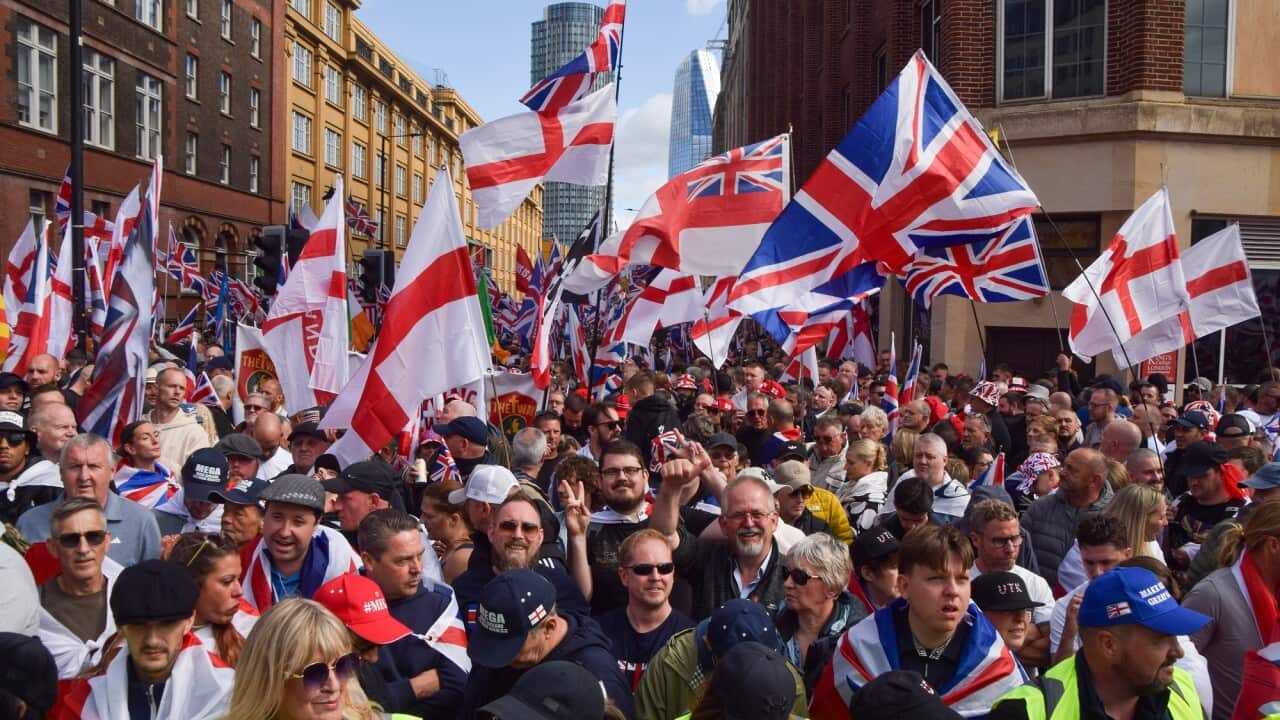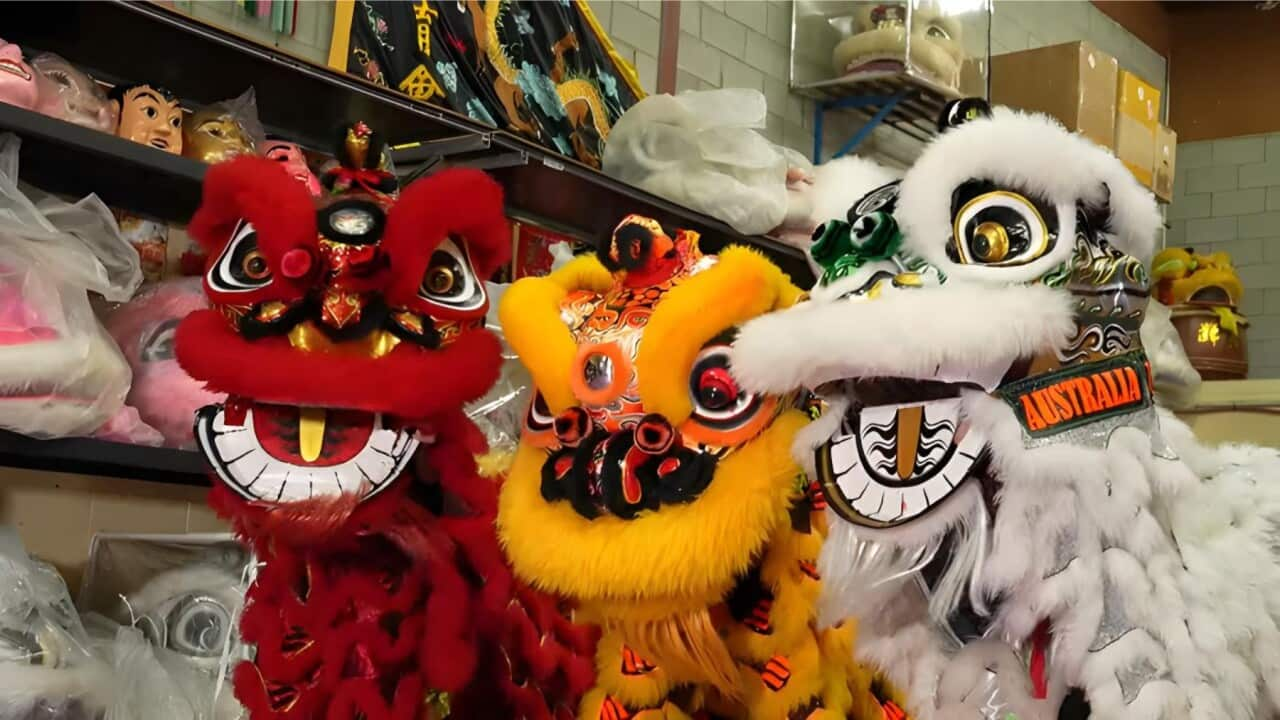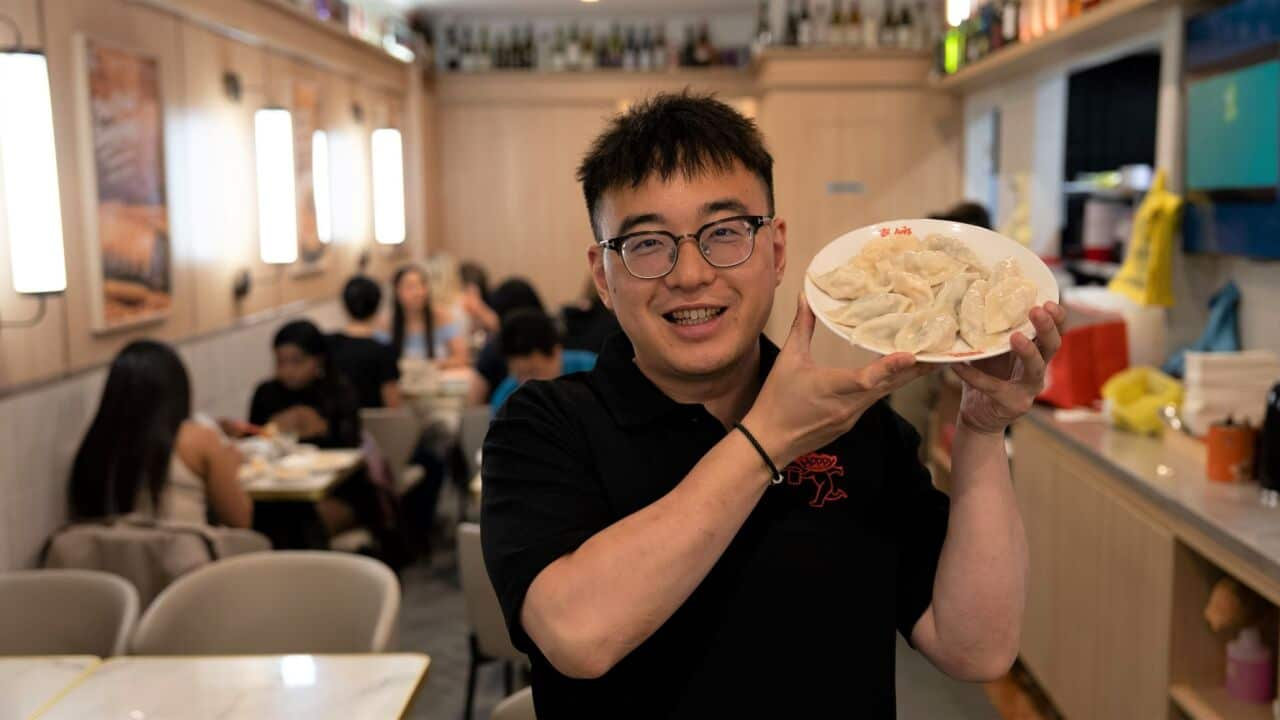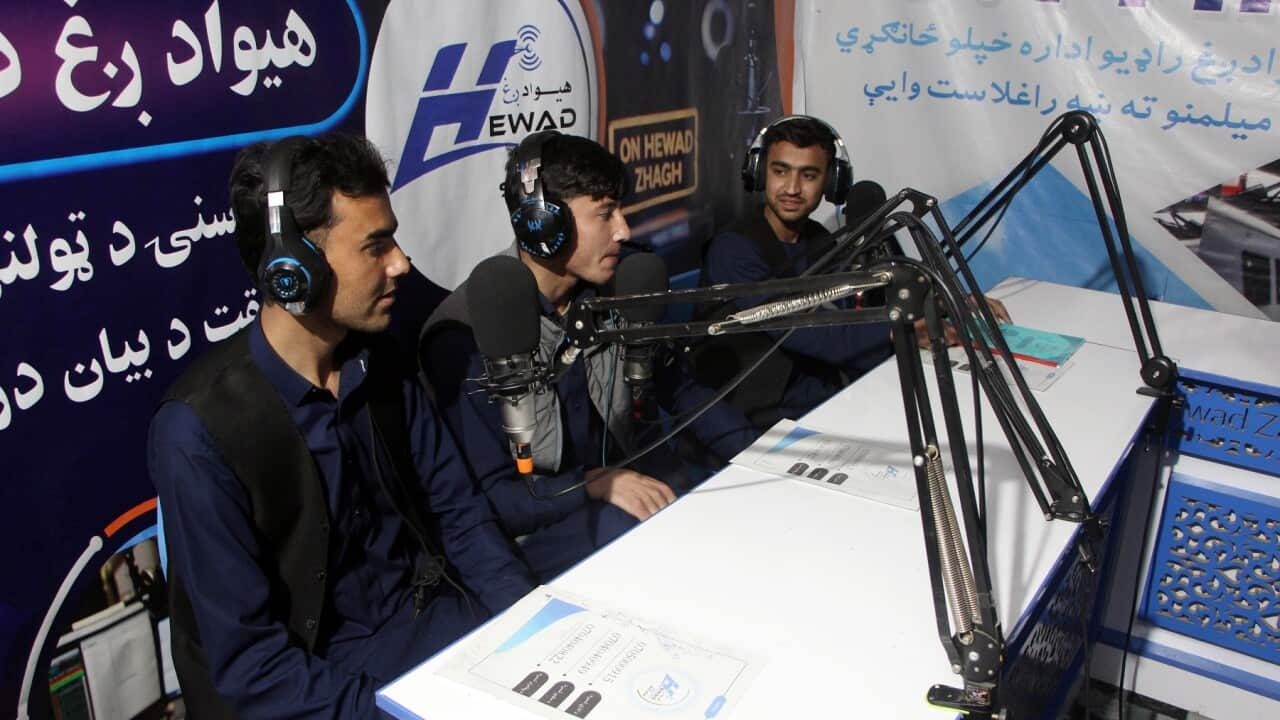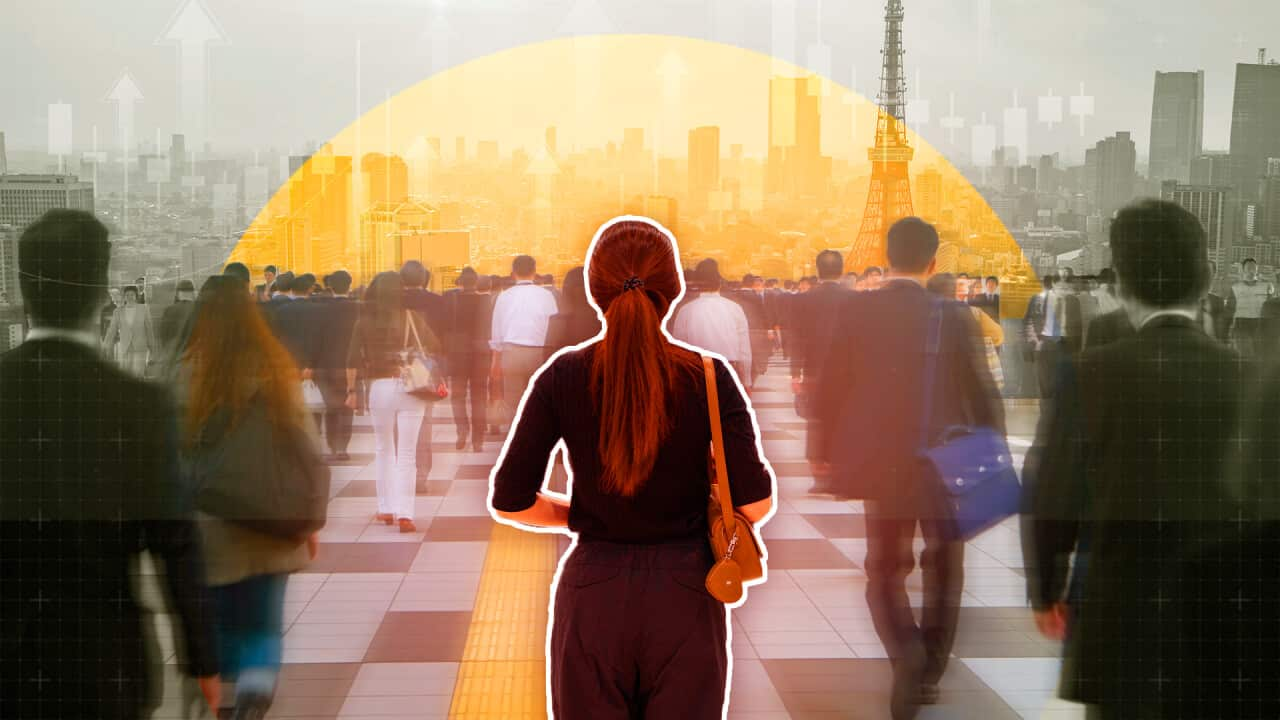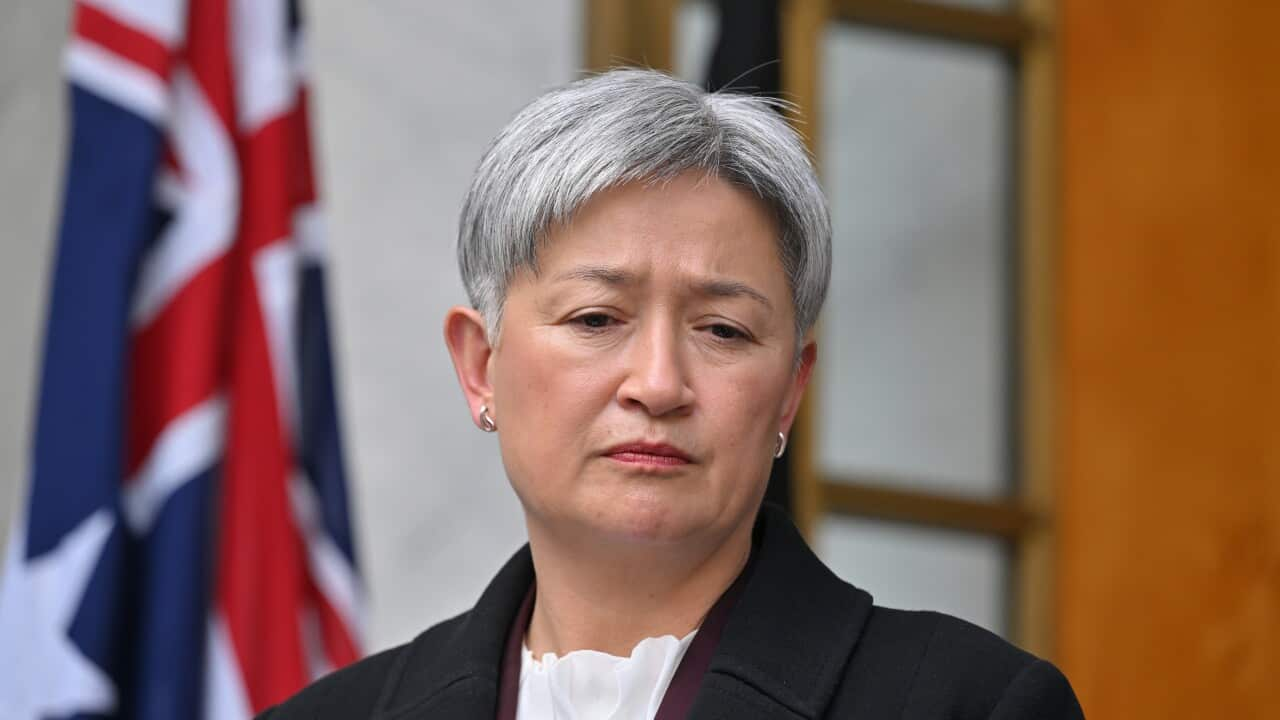Listen to Australian and world news, and follow trending topics with SBS News Podcasts.
TRANSCRIPT
(Sound of protesters yelling in London)
A weekend of protests in both Australia and the United Kingdom.
The fatal shooting of US conservative political activist Charlie Kirk was seized upon by organisers in the U-K to mobilise what is described as the country's largest ultra-conservative rally in decades.
Rally attendees used the slogan 'Unite the Kingdom' to voice their grievances.
Protesters: "This is our country, you should be standing with us. Boo"
Police estimate between 110,000 and 150,000 people attended the anti-immigration rally, outnumbering the 5,000-strong counter protest.
Twenty-four people have been arrested - and eight people have been charged with offences, including assault, after officers were hit by flying projectiles at the protest.
In Australia's capital cities and some regional areas, large groups marched under what organisers called the Australia Unites Against Government Corruption rally [[13 Sept]].
"Aussie, Aussie, Aussie, Oi Oi Oi."
It comes a fortnight after similar rallies attended by neo-Nazis.
This protester in Sydney says he is unhappy with the federal government.
"Because I am Australian and I'm here with my Australian friends, and I want to celebrate this country as it is - with its people and its culture; with a government that can do its job properly. Albo, you're not doing your job properly, mate."
Both in the UK and Australia, there were counter-protests calling out racism.
Experts say there are a number of driving forces behind the recent ultra-conservative, anti-immigration protests in the UK and Australia, but the rallies themselves are "not particularly exceptional".
"In just the same way, as we saw large-scale political mobilisation around the COVID-19 period where you had a lot of people turning out (to protests) because of perceived infringements on civil liberties and they were turning to protest things like mask mandates and vaccine mandates."
That's Callum Jones, who's a political extremism researcher from Monash University.
He told SBS News, economic and social uncertainty is a factor exploited by extremists.
Mr Jones says these groups seize on grievances to build their membership base, using issues such as housing and the high cost of living as part of their recruitment tactics.
"You know entitlements or privileges or access to resources that are being taken away. And then there are certain groups that are scapegoated as being the people who have taken away those previously accessible resources or privileges".
In a recent piece he co-authored in The Conversation, Mr Jones argued that there are growing transnational links between extreme movements that see themselves as united over issues including what he identifies as: the defence of so-called Western Civilisation, opposition to mass immigration, and the preservation of white identity.
He told SBS News that social media makes it easier for actors to disseminate propaganda and break down geographical barriers.
Mr Jones also says the spread of ultra-conservative ideologies globally online is made easy because the broad tenets of the ideology are easily adaptable to local issues.
"Something like immigration - it's a very broadstroke concept, but it can be localised into a national context very easily."
Dr Liam Gillespie at the University of Melbourne researches extremist political violence.
He says social media amplifies message, enabling nationalist groups to connect across borders.
But he warns against simply blaming social media for leading to political polarisation, saying it cannot amplify sentiments that do not already exist.
Dr Gillespie also said there have been long-established transnational links between ultra-conservative organisations.
"These groups have also been connected in their own way. So we have long histories of white supremacist groups and white supremacist militia in the US being connected to groups in Australia or the UK or South Africa, or wherever else. It's just those sorts of connections are accelerated now."
He says the language used by politicians - that are then portrayed in the media - has also contributed to these movements.
This can include remarks that demonises international students and asylum seekers.
"These mainstream actors and politicians lay the groundwork for to then take to the streets and then engage in political violence, which can seem as though it's just popped up out of nowhere".
He says the recent anti-immigration rallies in Australia and the UK are not new - or exceptional - in recent history.
Dr Gillespie says the phenomenon is better understood as being cyclical in nature.
He also stressed that suggesting this moment is unique can be dangerous.
"These groups need to make it seem as though their ideology is not fringe and extreme, but rather is mainstream and palatable and growing in terms of its acceptance within mainstream society. Because it's easier to get someone to agree to something, if they don't think that they're taking an extreme stance."
Other experts have shared with SBS Examines that media organisations need to treat this issue with caution when reporting.
Professor Julian Droogan is an expert on criminology and counterterrorism from Macquarie University.
"If the media is not careful with its language and just assumes or says that those Australians are part of that far right movement just because they've been attracted to one of these spaces. Well, in a sense there's a danger that people be pushed further and further in to identifying with these extremist groups."
Dr Abul Rizvi was the deputy secretary of the Department of Immigration and Citizenship between 2005 and 2007.
He told SBS Examines, when misinformation gets amplified and repeated, it can be hard to correct.
"We had a number of media organisations - actually pushing numbers that were just nonsensical. And they were just accepted by the general public - it would appear - and they were quoted by many of the speakers at these marches. That's just wrong. The ABS (Australian Bureau of Statistics) tried to correct them. And then the ABS itself was attacked for simply offering a correction."
He says both Labor and Liberal parties haven't addressed immigration policies to the nation, as they should.
"Both major parties have shied away from trying to explain immigration policy to the Australian public. They use platitudes like we're the greatest multicultural nation on the planet, et cetera, et cetera. But that doesn't actually explain immigration policy and where we're headed."
Dr Rizvi says that's left space for conspiracy theorists.
"The lack of explanation for the data has left a situation where conspiracy theorists, people with extreme views, can fill the vacuum."
Politicians are warning against the risks of extremism and political violence.
New South Wales Premier Chris Minns says the growing tensions are concerning - and the risk of political violence must be mitigated against.
"And as the leader of the state, I am going to do everything I can with New South Wales Police that if anyone crosses that line - and their opinion jumps from just an opinion into forcing someone to believe it trying to assault someone because they don't believe it; we're going throw the book at you. If you're going to have a protest, have your protest, have your say. Don't try and assault someone. Political violence has no role or place in Australia. And we need to confront it wherever we see it."
